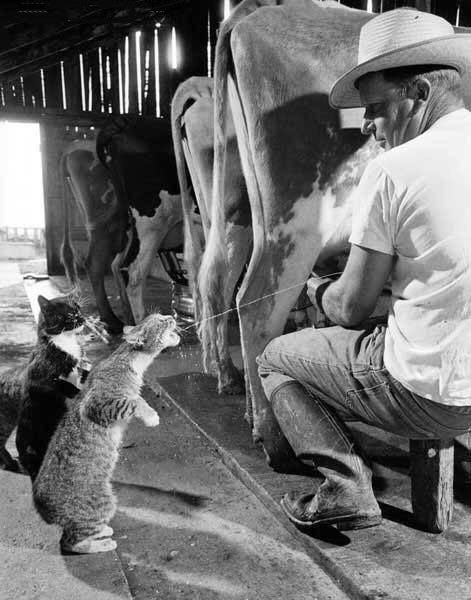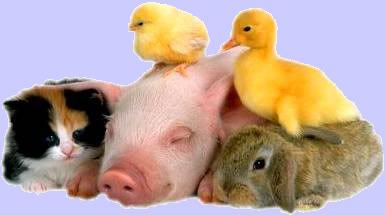(1 pm. – promoted by DDadmin)

How many “scientific studies” do you read of that make you think DU-huH! I could’ve told you that?
I saw this headline this morning Farm Kids Healthier & thought exactly that.
This has been one of my theories for yeears:
You need a little dirt in order to be healthy
When my mom would visit I often caught her squinshing up her nose at the state of my house.
I would tell her: My house is clean enough to be healthy & dirty enough to be happy.
Moms house was spotless at all times. People on our block would often joke you could eat off her floors.
While mine was not nearly as well kept it was not a superfund site or anything.
Our children were hardly ever sick. But then I never scolded them for making mud pies & actually eating some, eating dog food & bisquits or eating food IN the garden without washing it first. I think that a little local dirt helps to stave off local disease.
Maybe I wasn’t so wrong in my thinking.

Farm kids at lower allergy risk, even in their 70s
The anti-allergy effects of an agricultural upbringing persist well into old age, new research from Sweden shows.Dr. Jonas Eriksson of the University of Gothenburg and colleagues found that people who spent the first five years of their lives on a farm were about 20 percent less likely to have itchy, runny eyes and noses due to allergies, from age 16 up through to age 75.
snip
Twenty percent of people who’d lived on a farm up to age 5 had allergic rhinitis, compared to 28 percent of people who hadn’t been raised on a farm. The effect was strongest among 16- to 30-year-olds (20 percent vs. 31 percent), and weakest among 61- to 75-year-olds (17 percent vs. 19 percent).Eriksson and his team also found that people living in the most urban area — within the town of Gothenburg, with a population of 700,000 — had the highest risk of allergic rhinitis, at 28 percent; this risk steadily declined as urbanization decreased, with 23 percent of rural residents suffering from the condition.
snip
Only farms with livestock confer this protection, Eriksson noted. How contact with farm animals might cut allergy risk isn’t clear, he added, although drinking unpasteurized milk and exposure to certain types of bacteria are two mechanisms that have been proposed.
About that milk….

Around here I have not seen feed-lot farms like I did in California, those where hundreds of cows are kept in a penned area and fed grain. Most, if not all of the dairy farms here have pasture raised cows. I sometimes go to the Vend-a-Moo where you can get fresh milk, pasturized but not homogenized. This milk is by far superior to ANYthing one can purchase in a store- even organic milk.

So this article was another DU-huH moment for me:
Is milk from grass-fed cows more heart-healthy?
If milk does the heart good, it might do the heart better if it comes from dairy cows grazed on grass instead of on feedlots, according to a new study.Earlier experiments have shown that cows on a diet of fresh grass produce milk with five times as much of an unsaturated fat called conjugated linoleic acid (CLA) than do cows fed processed grains. Studies in animals have suggested that CLAs can protect the heart, and help in weight loss.
Hannia Campos of the Harvard School of Public Health in Boston and her colleagues found, in a study of 4,000 people, that people with the highest concentrations of CLAs — the top fifth among all participants — had a 36 percent lower risk of heart attack compared to those with the lowest concentrations.
snip
“Because pasture grazing leads to higher CLA in milk, and it is the natural feed for cattle, it seems like more emphasis should be given to this type of feeding,” she told Reuters Health by email.Dairy products in the U.S. come almost exclusively from feedlots, she added. And cow’s milk is the primary source of CLA. (Beef contains a small amount.)
snip
Further, the benefits of CLA may extend beyond the heart to the prevention of cancer and diabetes, suggests McGuire, pointing to results of other animal studies. “Milk is actually the only food ever ‘designed by nature’ to be fed to mammals,” she added. “We need to look to milk as the perfect food and learn everything we can from it.”

On a farm much of the tending of smaller animals (chickens, goats, babies abandoned by their mothers, cats & dogs) fall to women. This exposes them to a large variety of animals & germs. When I became pregnant the first time I worked on a farm tending baby chickens & for about 2 months feeding 3 calves their bottles. Everyone said I shouldn’t be exposed to “all those germs” & called me hard-headed for not listening.
Moms’ animal contact may lower babies’ eczema risk
Babies born to women working with farm animals appear to have significantly less eczema than babies who were not exposed to animals before birth.A European research team reports in the Journal of Allergy and Clinical Immunology that a mother’s contact with farm animals and cats during pregnancy has a strong protective effect against atopic dermatitis, a serious skin condition also known as eczema, in the baby’s first two years of life.
In eczema, an overactive immune system leads to chronic itchy scaly skin rashes that come and go. Nearly a third of children who develop it before age two go on to develop hay fever or asthma.
snip
The researchers found that while the all the children of farm moms had lower risk of eczema, the greater the variety of animals (horses, pigs, cows, sheep, rabbits, poultry) their mom contacted, the lower the kids’ risk.“For each additional farm animal species the mother had contact with, we observed a (risk) reduction of 20 percent,” they wrote. They also found a similar significant association between mothers’ contact with cats and the skin rash disorder in the children.
snip
The women in this study worked on small family farms. Roduit said it’s difficult to apply the findings to women working in large industrialized farm settings.

What “scientific studies” have you read of that make you think DU-huH! I could’ve told you that?
cross-posted from firefly-dreaming

11 comments
Skip to comment form
Author
I hope the citations in your article are correct.
I do wonder if farm kids in this country are healthier, though. Being raised on a farm more years ago than I care to admit, I recall that when I was a child I was given strict orders not to touch the corn used for planting. The kernels, rather than being yellow, were a reddish purple color, apparently coated with some kind of protective poisonous coating.
When I was in grade school, row crops (such as corn and soybeans) required cultivation (to remove weeds between the rows) until the plants grew tall enough to create sufficient shade to crowd out any weeds that might try to compete. Then, suddenly, we never cultivated any more. My dad used a sprayer to apply something called Atrazine. After that not a single weed grew between the rows. Atrazine seemed like quite convenience at the time, but it seems that it has contaminated the drinking water in agricultural areas, particularly in the Upper Midwest. The following article lists some of the associatd health risks.
We also used strong chemicals in cleaning the dairy equipment and sprayed milk cows in the barn so that the flies would stay away from them. When the cows were sprayed, a pungent cloud hung about the barn for quite some time.
There is also the matter of mutating viruses passing between humans, swine and birds. The close proximity of the three on a diversified farming operation would presumably increase the risk of transmission between the three. After all, we have all heard of the swine flu, bird flu and of course, the different varieties for which many humans receive vaccinations each year.
Could the health benefits apply on an organic farm? Quite possibly. In this country, particularly on the factory farms that are predominant, I suspect that the risks are far greater.
Life for animals raised on a farm is much more cruel now than it was when I was young (which was bad enough). The happy picture of Old McDonald’s farm advertised to us by the food companies presenting a misleading picture of what, at best, seems merely an anachronism from a distant past.
That said, organic farms and those in countries that ban pesticides, herbicides and genetically modified seeds may well be a happy exception.
Thanks for posting this thought-provoking article.
Author
oh well, thanks a lot , i’ve always wanted to deal with some resume services which might be the way too helpful over the thing
so when I drove up to New Hampshire to meet with Richard Gage of architects and engineers for 911 truth part of that meeting involved that most “subversive” practice of the consumption of non-pasturized real actual milk I was most dissapointed.
On a good news note it does appear that rural internet access reliability will hamper the efforts of the recent Food Safety microchip the lettuce Monsanto enabling fascism Bill.
have stronger, more resilient immune systems than children whose parents have kept them in a bubble of super-cleanliness all their lives, used anti-bacterial soaps everywhere, and did not advocate having pets around the house, and refuse to let their children be exposed to dirt.
Not only has that resulted in many more of today’s children developing allergies and/or chronic illnesses such as asthma, etc., but the anti-bacterial soaps and detergents on the market have had a very adverse affect on the environment, creating superbugs that’re often virtually, if not downright impossible to eradicate, even with stronger antibiotics.